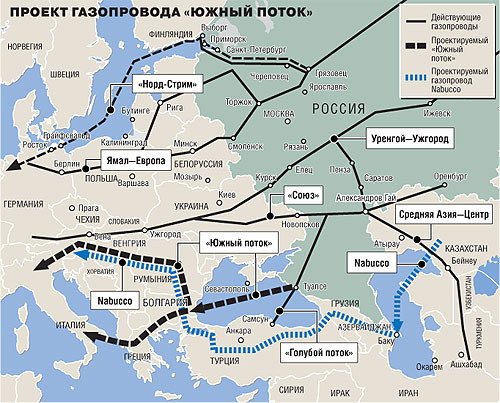Greece sweet talks US but marries Moscow
6 Απριλίου 2009
Author: Kostis Geropoulos
Ilham Aliyev, the first president of Azerbaijan to carry out an official visit to Greece, met with almost all of the Mediterranean country’s top leaders who hailed the visit, highlighting the emphasis Athens places on Baku. The significance is not because of Greece’s historic ties with Azerbaijan or that the Azeri leader is a poster-child for democracy (that’s another future column all together: Authoritarian leaders and energy – are there any other kind?) But because Azerbaijan has a precious resource for European consumers – gas. And Washington insisted on it.
Every chance they get, US officials express their concerns that Russian gas monopoly Gazprom’s South Stream pipeline, which Greece has also decided to join, would in some way delay or sideline the Interconnector Turkey-Greece-Italy (ITGI) and therefore hinder EU efforts to reduce its reliance on Russian gas. Greece, which favours both natural gas projects as it strives to become an energy hub in the region, has brushed off such concerns. US Senator Richard Durbin and Illinois State Treasurer Alexi Giannoulias visited Greece last week before moving on to Turkey, and Greek Foreign Minister Dora Bakoyannis is expected to meet with US Vice President Joe Biden and Secretary of State Hillary Clinton in Washington this week, setting the ground for a possible meeting between US President Barrack Obama and Greek Prime Minister Costas Karamanlis in March.
Greece is ready to sign agreements for natural gas supplies directly from Azerbaijan, Karamanlis said at a business forum at the Athens Chamber of Commerce and Industry (ACCI) on February 17, amid business contacts between Azeri and Greek entrepreneurs. At the same forum, newly-appointed Development Minister Costis Hatzidakis, who was a member of the representation of the European Parliament at Azerbaijan and Georgia for five years, reiterated the premier’s statement that Greece is creating a new avenue for natural gas from the Caspian Sea through the ITGI, which is planned to be completed by the end of 2013. In 2007, Greece and Turkey inaugurated the section of the pipeline between the two countries and it is planned to be extended to Italy. At the same time, the less-known Haskovo-Komotini pipeline project from Bulgaria to Northern Greece, which is connected with the ITGI “reinforces its dynamic and attractiveness,” Hatzidakis told the forum.
The Greek minister also said that Greece plans “to speed up the processes for the Bourgas-Alexandroupolis oil pipeline,” noting that he recently met with the consortium, which undertook the project. However, Hatzidakis started his speech at the forum by saying that the Russia-Ukraine crisis underscored the importance of having “different paths and alternative sources in order to safeguard energy supplies for all countries.” “Within the framework of this policy we promote the construction of the South Stream pipeline and we work extensively with everybody involved in order not waste time,” Hatzidakis said, as his predecessor Christos Folias, who has racked up enough frequent flyer miles to Moscow to go to the Moon and back twice, was sitting in the audience. On February 19, Hatzidakis discussed the ITGI with Italian Industry Minister Claudio Scajola in Brussels and briefed US Ambassador in Athens Daniel Speckhard on February 20, the latter stressing “the importance for energy diversification.”
So does Azerbaijan have enough gas?
Tatiana Mitrova, head of Moscow’s Centre for International Energy Markets Studies, doesn’t think so. She told New Europe that the cases for ITGI and Nabucco pipelines are very similar and Azerbaijani production volumes alone are not enough to fill the pipelines. “The US is pushing for Nabucco very, very much and all the participants of the Nabucco consortium say that they feel this very strong pressure when representatives of the Department of State are coming and demanding: ‘When are you going to build it?’ But they are not giving money and they are providing gas and in this case any sorts of demands will not make the realisation of this project closer,” Mitrova said.




